- Home
- A. J. Hartley
Will Power
Will Power Read online
WILL POWER
BOOKS BY A. J. HARTLEY
The Mask of Atreus
On the Fifth Day
What Time Devours
Act of Will
Will Power
WILL POWER
A. J. HARTLEY
A TOM DOHERTY ASSOCIATES BOOK
New York
TABLE OF CONTENTS
TITLE
COPYRIGHT
DEDICATION
ACKNOWLEDGMENTS
TRANSLATOR’S PREFACE
SCENE I: Unadulterated Hawthorne
SCENE II: Who Goes There?
SCENE III: The Only Way to Travel
SCENE IV: Bird Watching
SCENE V: Sorrail
SCENE VI: Flight and Refuge
SCENE VII: Hawthorne to the Rescue
SCENE VIII: Eventor
SCENE IX: The White City
SCENE X: The King
SCENE XI: Words, Words, Words
SCENE XII: Holding the Walls
SCENE XIII: Stranger Still
SCENE XIV: The Plot Thickens
SCENE XV: A Long-Awaited Meeting
SCENE XVI: A Fly in the Ointment
SCENE XVII: The Dead Forest
SCENE XVIII: Goblins
SCENE XIX: The Halls of the Dead
SCENE XX: The Soul of the Arak Drül
SCENE XXI: Aftermath
This is a work of fiction. All of the characters, organizations, and events portrayed in this novel are either products of the author’s imagination or are used fictitiously.
WILL POWER
Copyright © 2010 by A. J. Hartley
All rights reserved.
Edited by Liz Gorinsky
A Tor Book
Published by Tom Doherty Associates, LLC
175 Fifth Avenue
New York, NY 10010
www.tor-forge.com
Tor® is a registered trademark of Tom Doherty Associates, LLC.
Library of Congress Cataloging-in-Publication Data
Hartley, A. J. (Andrew James)
Will power / A. J. Hartley.—1st ed.
p. cm.
“A Tom Doherty Associates Book.”
ISBN 978-0-7653-2125-1
1. Outlaws–Fiction. 2. Goblins–Fiction. 3. Space and time–Fiction. 4. Adventure and adventurers–Fiction. I. Title.
PR6108.A787W56 2010
823'.92—dc22 2009040643
First Edition: September 2010
Printed in the United States of America
0 9 8 7 6 5 4 3 2 1
To my parents, who, unexpectedly, liked the first one
—AJH
ACKNOWLEDGMENTS
I’d like to thank my agent, Stacey Glick; my editor, Liz Gorinsky; and my wife (always my first reader), who helped make this book a reality.
Please visit my website, www.ajhartley.net, to pass along comments and see details of other projects, completed or in the works.
Thanks for reading.
A. J. Hartley
WILL POWER
BY
WILLIAM HAWTHORNE
Translated from the Thrusian by
A. J. HARTLEY
TRANSLATOR’S PREFACE
It is with some trepidation that I present to the world this second installment of the Hawthorne saga. Like the first volume, Act of Will, it has been translated from the original Thrusian—as preserved in the now famous Fossington House papers—with the aid of notes left by the Elizabethan translator Sir Thomas Henby. As readers of the first manuscript will quickly see, the second volume is different in key respects from the first, and raises still more vexing questions of provenance, locale, and issues of how much of the narrative—if any—is derived from fact. My initial assumption—for reasons that will become apparent as the story unfolds—is that the work is pure fantasy, though other manuscripts from the Fossington House collection have since emerged that seem to root elements of the narrative in fact. The details of those materials will be published in a series of academic papers in forthcoming issues of Philological Quarterly, though I doubt they will hold much interest for the general reader.
Since the history of the manuscript collection is now well known, I will say only that I remain in the debt of Sir Thomas Henby, whose notes from the 1580s and ’90s remain the core of my own translation. The tone, however, is the result of my own efforts to maintain some of the precocious energy of the Thrusian original, as I did with Volume One. Due to the rushed nature of the publishing schedule, I write this before beginning even preliminary work on the other pages seemingly penned in the same language, so I am not in a position to say whether there is more of the Hawthorne Saga to come or whether these two self-contained narratives are the entirety of Mr. Hawthorne’s labors. If more come to light, I will, of course, endeavor to make them available to the public in English so that they may become more than curiosities for ethnographers and linguists.
—A. J. Hartley, 2010
SCENE I
Unadulterated Hawthorne
Far be it from me to blow my own trumpet, but I was about to become a bit of a legend. We had been lying around Stavis mulling over our triumphs in Shale three weeks ago like a family of pythons that had recently gorged on a rather less fortunate family of gazelles, or whatever the hell pythons eat. Now we were going to see a little excitement. I had, I must say, been quite happy doing the python thing, but sleeping late and producing no more than bodily excretions for a whole month had started to wear a bit thin even for me. The others had, of course, tired of it rather earlier.
Garnet and Renthrette, our straight-from-the-shoulder brother and sister warriors, had been spoiling for a fight with anyone who made eye contact for a couple of weeks now. Even the generally placid, if surly, Mithos, the famed rebel and adventurer who had tormented the Empire for close to twenty years, had recently started pacing the Hide’s underground library like the proverbial caged cat. Orgos, our overly noble weapon master, had begun polishing his swords again, barely concealing a mood as black as his skin. I saw little of Lisha, our girlish but revered leader, because she was usually busy poring over maps or gathering news on Empire patrols. Yours truly—Will Hawthorne, former dramatist, actor, and con man, current apprentice adventurer, and damn-near-professional gorged python—couldn’t really see what all the fuss was about. We had solved the riddles of Shale and environs, or most of them, and had come away feeling virtuous, and, more importantly, rich.
With me so far? I hope so, because—as is now graven in theater lore—nothing kills a story like exposition. I once had to be in this play when nothing happened for twenty minutes because all this backstory had to be wheeled out for anything later to make sense. Not surprisingly, we got booed offstage a quarter of an hour in. So I’ll be moving on. That’s who we were and what we’d been doing. But by this point, even I had become conscious that—if I might milk the python metaphor one last time—the flavor of warm gazelle meat was becoming a rather distant memory.
Thanks to my investigative brilliance, this was about to change, but before we got to the adventure bit there was food to be eaten. We were dining in the Waterman, one of Stavis’s many traders’ inns, in the northwestern part of the city. It was eight o’clock, and, perhaps for the first time this season, the landlady was lighting a fire in the main hall’s grate to ward off the chill that came with early autumn. To our left was a party of wool merchants who ate nothing but baked potatoes straight from the oven: no butter, no salt, no herbs. Yet they were munching with an enthusiasm which meant they either came from somewhere that had little or no food of any kind or that they were seriously delusional. To our right was a family of ebony-skinned Trellenians swathed from head to foot in lustrous silk and eating a curry that would strip varnish. At the bar was an
elderly man in dignified black, sipping Venarian claret. And on the table in front of us was a large game bird known locally as a rossel, roasted and carved to perfection, surrounded by tiny links of smoked sausage and a moat of thick, hot sauce made from tart red berries, the whole sumptuous display sitting among spinach leaves and wedges of lime, steaming invitingly. Even the wool traders’ mouths were watering.
“Where was I?” I said as the serving boy left us. “Oh yes. So then Venario is on stage by himself, lying in wait for Carizo and Bianca. His sword is drawn and he’s ready to attack Carizo and have his way with Bianca. He has a few smug words with the audience and takes his position behind one of the front pillars. Then, hearing a noise, he leaps out. But it’s not Carizo. It’s the ghost of Benario, rising out of a trapdoor and wailing: ‘See here, O cursed wretch, the gaping wounds/Which thou didst carve into my living flesh . . . ’ ”
“Who’s Benario?” said Garnet.
“What? Oh,” I began, “he’s the bastard son of Duke Ferdinand, the one that Venario killed in the first act because he saw . . .”
“Who’s Venario?” said Lisha.
“Who’s Venario!” I exclaimed. “Haven’t you been listening at all? All right. Venario was exiled from the court for having an incestuous relationship with his sister, who he later murdered with a poisoned pot of geraniums and . . .”
“I thought you had word of a job,” murmured Mithos.
I gave him a long, pained look. “Don’t you want to hear what happens next?” I said, injured.
“Sorry,” he said, “but I thought we’d come here for a job.”
“Fine,” I replied, testily. “Fine. Right, forget the play. It’s not important. After all, I only wrote it. . . .”
“All right. . . .” Mithos sighed.
“No,” I inserted. “No. We are here for a job, so that’s what I’ll tell you about. Firstly . . .”
“Wait a moment,” Orgos said, eyes glued to the rossel’s golden brown breast.
“Do I get to finish a sentence tonight?” I asked.
“Not yet,” said Orgos. “It would be criminal to discuss business over so excellent a feast.”
Mithos sighed again and added, without any enthusiasm whatsoever, “So serve it.”
He had a way of discussing the most exotic or delicate meals like they were day-old porridge. He ate them like that, too, mixing things together and spading it down his throat so that it barely touched his tongue. Garnet regarded the great bird with the blend of curiosity and distaste he usually reserved for me and took a forkful gingerly, as if it might come back to life and bite his hand off. Only Orgos seemed to accord the food anything like the respect it deserved.
This had been intended as a surprise feast to celebrate our next adventure, though I should have known that the adventure itself was the only sustenance they needed. I, still sulking about not being able to finish my story, chewed in sullen silence and resolved to make them wait for the day’s big news: news which, with a tremendous effort, I had managed to keep to myself thus far.
Earlier that day I had been sampling a pint of milk stout in one of Stavis’s less seemly hostelries, nostalgically reliving my Cresdon days as a cardsharp, actor, and storyteller, when I fell into conversation with a man of about fifty-five whose eyes held a strange and compelling light. He had some very interesting news.
In a matter of minutes this helpful chap, whose name was Mensahn, would join me and the rest of the party in the Waterman and give us vital information which would allow us to release Dantir, the famous rebel hero. Yes, that Dantir: the guy who had pinned down the Empire’s fourth army during the conquest of Bowescroft with little more than rumor and a handful of well-trained archers. He was the Empire’s prize captive, and they periodically threatened to execute him when things got unruly anywhere in Thrusia. The rebels (and that included most adventurers) wanted him back, partly because he was a bit of a legend and partly because he knew just enough about rebel operations to be dangerous.
And we could save him. Pretty heady stuff, eh? And it was all thanks to me. Our recent inactivity had allowed some of the suspicion with which the party had first greeted me to resurface, if only in muted forms, but this new triumph would remind them of my genius, and my usefulness. After one brief operation they would be feasting me, putting my name in songs, throwing gold at me, and—in Renthrette’s case—maybe herself, too. As I said, I would soon be joining Dantir himself in the rebel’s Hall of Heroes. I munched on the tender flesh of the rossel and my good humor returned.
“I’ve not been in here for weeks,” said Orgos, glancing around the place. “Months, even. Not since that idiot Lightfoot took over the Empire’s intelligence sector.”
There was a flicker of amusement around the table and Orgos snorted to himself, as if remembering something funny.
“Who’s Lightfoot?” I asked.
Garnet took up the story, an uncharacteristic grin splitting his pallid face. “He was a staff sergeant in the Oakhill garrison for years. Then—God knows how—he got himself posted here to intelligence, probably because nothing ever happens here for him to get in the way of. He must have been a terrible liability in Oakhill.”
“I heard he once slaughtered and burned a flock of sheep that the garrison had impounded for their winter meat,” inserted Renthrette, “because one of them reminded him of a local rebel. Something in the eyes, I suppose. The soldiers were famished for weeks.”
“He’s insane?” I ventured.
“Let’s say ‘eccentric,’ ” Orgos qualified. “He sees rebels everywhere and has devoted his life to lunatic schemes designed to flush them out. Almost every month he goes from tavern to tavern trying to lure adventurers or members of the resistance into an ambush with tales of Empire treasure convoys or defenseless generals. Then, at the appointed time, he shows up at the pub or wherever with a hundred soldiers and storms in. It is always deserted except for a few random traders. He interrogates them for a few hours and then lets them all go with an official pardon and a couple of silver pieces in compensation. It costs the Empire a fortune.”
“Really?” I said, slightly uncomfortable.
“Lately,” Garnet joined in cheerfully, “he’s reverted to that ludicrous yarn about Dantir the great rebel hero. As if the rebels would do anything to get that old drunk back anyway. The only secrets he had concerned the whereabouts of the Empire’s cache of Thrusian grain whiskey.”
“Hasn’t Dantir been dead for years?” asked Renthrette.
“At least two,” answered Mithos, distantly.
“Really?” I managed again. Against all odds, I had lost my appetite. Beads of cool sweat had pricked out across my forehead. This was not good.
“How could even someone as harebrained as Lightfoot believe that anyone would fall for such an obvious ruse?” Renthrette wondered, sipping her wine. “I mean, how asinine can anyone be?”
“The story which is supposed to bring us all running into the arms of the Diamond Empire this time says that Dantir is being moved around,” Garnet continued, now breaking into outright laughter, “with an escort of elderly ladies, or something. . . .”
“One Empire platoon, actually,” I spluttered thoughtlessly. “It’s not that preposterous!” My voice was rising defensively. “All right, it might not be likely, exactly . . . but it is, you know . . . plausible. Kind of. I don’t see why you think it’s so obviously ridiculous. If you lot didn’t already know of this Lightfoot character you might have fallen for it. It is possible, you know, that your bloody perspicacity wouldn’t be so dazzling if you didn’t have all the facts in front of you. They could have been moving Dantir around. They could!”
There was a momentary silence as the smiles and good humor slipped away as if I’d mentioned that one of their elderly relatives had just kicked off.
“You didn’t,” growled Mithos across the table.
“Well . . .” I began, but, unable to shake off his eyes as they burned dark and hard into mine,
I decided to leave it there.
“That was the big adventure you promised us?” stuttered Garnet as realization dawned like an unwary sun in a very cold place. “That was what you brought us here for? You stupid, simple-minded, moronic . . .”
“Lightfoot is going to arrive here any minute with a hundred troops?” said Lisha quickly, clarifying.
“Actually,” I faltered, glancing at the clock over the bar, “he’s slightly late.”
There was a thundering of chair legs on the wooden floor as they leaped to their feet. Almost simultaneously, there came the distinctive creak and slam of the inn’s door being flung out onto the chill evening air. I spun to see the white cloaks and silver scale of Empire troopers filing in, two abreast.
We weren’t exactly armed to the teeth right now, and a pitched battle against a force this size would have led pretty quickly to our being carried out in casserole-sized joints. There were no obvious ways out of this situation. Our options were starting to look like hanging or beheading (at best) when Lisha prodded me firmly in the ribs. I turned, my face aghast and sickly, to find her staring up into my face, her black eyes even narrower than usual. She took hold of my wrist and gripped it firmly, as if I was about to run (she knew me pretty well by now). Through barely parted lips she hissed, “You got us into this, Will. Now get us out.”
That was all she said, but the looks of menace I was getting from Garnet and Mithos underscored the point. Renthrette had closed her eyes, frustrated at herself for believing for a moment that I wasn’t a walking death trap with the mental agility of a beer keg. Orgos glanced around the room as it flooded with soldiers, as if he was still calculating the odds of a last-ditch stand. His hand strayed to the hilt of that huge sword of his, the one with the yellowish stone in the pommel.
Turning swiftly toward the approaching footsteps I found myself looking into the slightly wild eyes of Lightfoot himself, now out of his rags and dressed in his best uniform. Uncertain what else to do, I smiled warmly and extended a hand. “Commander Lightfoot,” I announced heartily, “how good to see you again.”

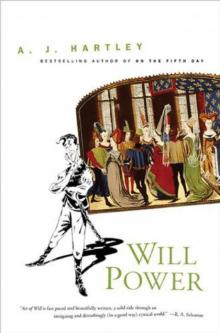 Will Power wh-2
Will Power wh-2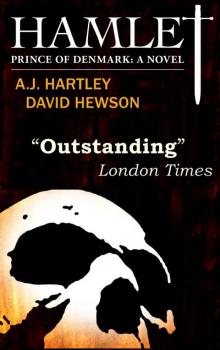 Hamlet, Prince of Denmark
Hamlet, Prince of Denmark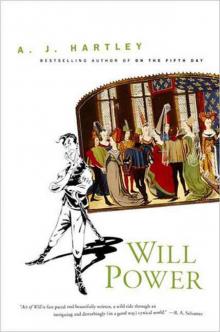 Will Power
Will Power Firebrand
Firebrand A Novel
A Novel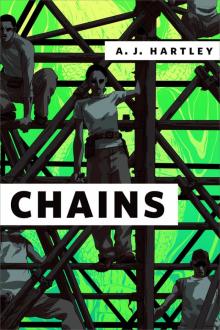 Chains
Chains Guardian
Guardian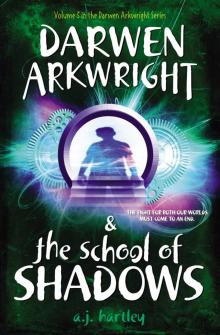 Darwen Arkwright and the School of Shadows
Darwen Arkwright and the School of Shadows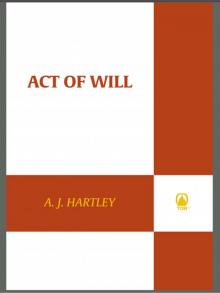 Act of Will
Act of Will Darwen Arkwright and the Insidious Bleck
Darwen Arkwright and the Insidious Bleck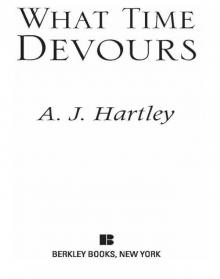 What Time Devours
What Time Devours